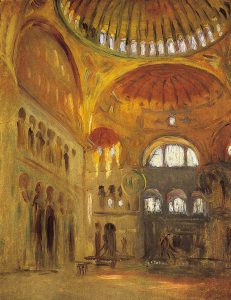
One of the Lenten services I’ve experienced in the last couple of years is the Orthodox “Great Compline.”
I’ve known the Western version of Compline very well for a very long time. In the West, Compline is the last of the monastic hours, a short gentle service, maybe 20 minutes of brief prayers and Psalms, entrusting one’s self to God’s care for the night.
It is a much beloved service. I picked up a very old copy of the Monastic Diurnal that had previously belonged to a nun, and the pages of the Compline service were worn until they were smudged and virtually falling out.
It is well-loved in the Episcopal tradition as well. When I lived in Seattle, hundreds of people, many of them high school and college students, would make their way to St. Mark’s Cathedral on Sunday nights at 9:30 to listen to the beautiful singing of the men of the Compline Choir, and to pray this most-accessible form of liturgical prayer.
Great Compline
The Orthodox version is a much bigger undertaking. Nearly a dozen lengthy psalms, half a dozen very long prayers, plus the Nicene Creed and other elements familiar from Orthodox services.
At Great Compline I’m struck in particular by two of the hymns. These are not the short hymns one often encounters in Orthodox worship. These are more like litanies, biblical verses interwoven with responses.
“God Is With Us”
The first is all or mostly verses from Isaiah, each of which the congregation answers
…for God is with us!
Here’s a YouTube of it. They are singing in Arabic, but the tune is what I’ve heard in the Byzantine tradition, and there are English subtitles:
“Lord Of The Powers”
The second is Psalm 150, that great call for praise using every imaginable instrument. After every verse the congregation sings the chorus,
Lord of the Powers, be with us;
for no other helper do we have in tribulations, but You.
Lord of the Powers, have mercy on us.
If you want to hear the haunting, loving, quietly beautiful melody here is a link to it on YouTube — no video, alas, but a lovely icon of the resurrection:
Both are lovely examples of a way the Orthodox encounter Scripture in worship. As well as readings, they often hear texts in music, with hymnody woven in. The hymnody is usually not repeated responses like in these two examples, but it always builds a prayerful conversational engagement with the text.
But these are both, for me, lovely Lenten meditations. When we are in the forty day long penitential slog to the Cross and the Resurrection, it helps to be reminded that “God is with us.” We don’t go through the fast or the repentance alone. We know we have turned the wrong way, again and again, but as soon as we begin to turn we find “God is with us” already.
And if the sobriety of the season has become a trial, or has reminded us of our trails and temptations, how good to be reminded that the “Lord of the powers” is our help, our only help, our always help.
The repetitious quality of the music, like in a Protestant praise chorus, gets the words deeply stuck in my head. Considering what generally gets stuck there — my obsessions about myself or about current politics — I am glad to instead have something deeply true, deeply good, and deeply beautiful going round and round in my thoughts.
As goes the music of our worship so goes our prayer life. Best to make sure we feed our prayer life solid food.

Wow.
Thanks for sharing this. It’s amazing how deep and vast the Christian tradition is.
Thanks, Gary. Great to hear from you. (Check out the other recent post on “Forgiveness Vespers.”)